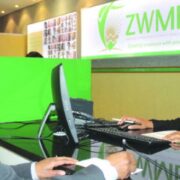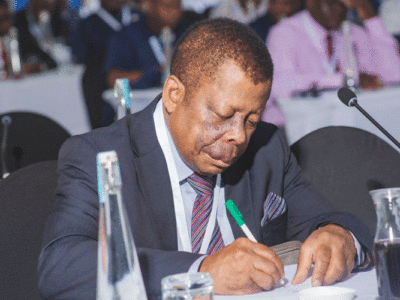Zimbabwe is charting a bold course towards a digitally-driven future, with technology playing a central role in the nation’s development agenda. At the heart of this vision is the 2024 Computer Society of Zimbabwe (CSZ) ICT Summit, that was held in the Victoria Falls running under the theme “Navigating Digital Solutions for a Sustainable Tomorrow,” brought together a diverse group of experts, innovators, and policymakers to explore how digital transformation can accelerate Zimbabwe’s progress toward sustainability.
Speaking at the Dr. T. A. Mavetera, Zimbabwe’s Minister of ICT, Postal and Courier Services, captured the spirit of the event with an insightful African proverb: “Tomorrow belongs to people who prepare for it today.” This sentiment set the tone for a forward-looking dialogue on how the country can leverage technology to build a resilient, prosperous future.
The summit underscored the government’s commitment to advancing its digital agenda, which is critical for achieving the goals laid out in Zimbabwe’s National Development Strategy 1 (NDS1). This strategy envisions transforming the country into an upper-middle-income society by 2030—a goal that hinges on a robust digital economy. Dr. Mavetera outlined the importance of this transformation, highlighting that technology is now a fundamental enabler of economic growth, social development, and governance.
“A robust digital economy is the bedrock upon which we will build the future,” she declared, emphasizing the need for innovation and digital solutions to be integrated across every sector. From education to healthcare, e-commerce to agriculture, and even mining, the government is positioning digital technologies as key drivers of national progress. Yet, as the country accelerates its digital integration, Dr. Mavetera reminded attendees that securing this infrastructure must be a top priority.
“We live in an era where digital transformation is not a luxury but essential,” she stressed, urging the public and private sectors to collaborate on building a secure, resilient, and inclusive digital landscape. This includes not only improving digital access and connectivity but also strengthening cybersecurity, protecting personal data, and ensuring that the population is digitally literate.
Echoing these sentiments, Dr. Mavetera referenced a statement made by President Emmerson Mnangagwa earlier this year. “Digital technologies must go beyond the use of ICT for social media and entertainment,” the President remarked in March 2024. “We must use the infrastructure that my Government is putting in place to improve service delivery in healthcare, education, and agriculture, among many other aspects.” This vision underscores the need for technology to be harnessed for tangible improvements in people’s lives, with a clear focus on improving public services and empowering citizens through digital tools.
The Minister also took the opportunity to commend the CSZ for its role in fostering dialogue on some of the most critical issues facing the country in the realm of ICT. From the opportunities offered by the Fourth Industrial Revolution (4IR) to the need for sustainable practices in ICT and tackling the challenges of cybersecurity, the summit served as a platform for discussing how Zimbabwe can create an environment conducive to innovation and growth. Dr. Mavetera urged all stakeholders to actively contribute to the ICT 2030 Master Plan, a visionary blueprint that outlines key areas of development, including Smart Government, Smart Health, Smart Agriculture, and Smart Education.
“Let us ensure that our digital infrastructure is secure, resilient, and trustworthy,” she emphasized, stressing the importance of collective action. This vision, she explained, is not the responsibility of the government alone, but requires active participation from the private sector, civil society, and individuals. The Minister highlighted the need to foster partnerships between various sectors to build a thriving digital economy, one that encourages innovation, collaboration, and social responsibility.
One key issue raised during the summit was the environmental impact of digital technology, particularly in relation to e-waste. As more devices are used in daily life, the disposal and recycling of electronic waste has become an increasing concern. Dr. Mavetera called for a concerted effort to address the environmental challenges posed by ICT, advocating for policies that promote responsible disposal, recycling, and the reduction of e-waste. “We must address sustainability not only through digital solutions but also by ensuring that our technological footprint is responsible and environmentally sound,” she remarked.
The summit also highlighted the growing need for digital literacy across all levels of society. As more sectors embrace technology, ensuring that Zimbabweans are equipped with the necessary skills to navigate this digital landscape is crucial. Dr. Mavetera stressed that building a digitally literate society is key to ensuring that no one is left behind in the country’s technological advancement.
In closing, the Minister expressed her confidence that Zimbabwe’s journey towards a sustainable digital future was well underway. With a focus on innovation, resilience, and inclusivity, the country is positioned to leverage the power of technology to create lasting change. The 2024 CSZ ICT Summit was not just an event, but a call to action for all Zimbabweans to join forces in building a digital economy that can support the nation’s vision for 2030 and beyond.
As Zimbabwe moves forward, the insights shared at the summit serve as a roadmap for the country’s digital transformation. With a collaborative spirit and a commitment to sustainability, the nation is poised to embrace the opportunities that technology offers, ensuring that the digital solutions of today lay the foundation for a prosperous, secure, and sustainable tomorrow.












Comments